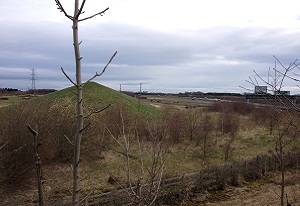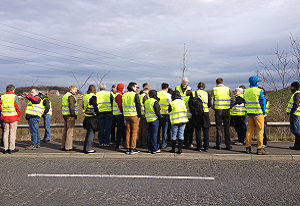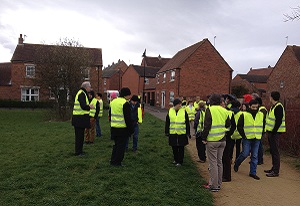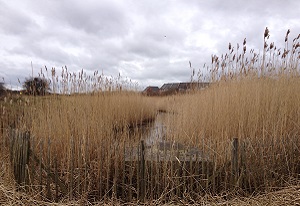
March 27, 2014, by Blue-Green team
Clean Water for All workshop Newcastle March 2014
This blog discusses an exciting new initiative between the Blue-Green Cities team and colleagues from the National Science Foundation (NSF) funded Portland-Vancouver ULTRA (Urban Long-term Research Area) project (or PVU). Blog post by Emily Lawson.
The Clean Water for All (CWFA) project began in January 2014 with an aim to build long-term, collaborative partnerships with American colleagues engaged in NSF-funded research that complements, without duplicating, that within the Blue-Green Cities project. We had out first workshop in Newcastle on 17-19th March, which consisted of a packed three days of talks, discussion, team building and a short field trip to see some of the SuDS (sustainable urban drainage system) schemes in Newcastle. The goal was to plan the research that will be carried out in Portland in May 2014. I will introduce our US colleagues and then talk more about what we got up to in Newcastle (and why we ended up wearing high-vis jackets…)
Portland-Vancouver ULTRA (Urban Long-term Research Area) project – PVU
The PVU project, currently in its 4th year, examines the role of governance for a pair of cities, Portland, Oregon and Vancouver, Washington, which have developed over the past several decades under contrasting policy regimes at the state, regional, and local levels. The project seeks to find how differences in local and state levels of governance and policy affect the resilience of both social and ecological landscapes, and how monitoring ecosystem services may provide a usable feedback loop in urban socio-ecological systems. PVU investigators are assessing multiple pathways through which human actions, governance systems, and the built and social infrastructure affect ecosystem services provided by landscape vegetation pattern and regional water quality. This features three cross-cutting activities which examine both natural system variables and social outcomes;
- landscape scale development patterns
- civic ecology, and
- environmental education
The project has three focused projects (water quality, stormwater management and urban riparian greenspace conservation) that primarily examine effects of social patterns and governance on natural system characteristics. This links well with the research interests of the Blue-Green Cities team.
The task for the Clean Water for All team
The CWFA team will focus their research on the Errol Tideman area, a sub-watershed in the Johnson Creek Watershed (see the Johnson Creek Watershed Council’s (JCWC) website for lots more information). This has been designated by the City of Portland’s Bureau of Environmental Services (BES) as top priority for improvement. Working closely with BES staff, especially Maggie Skenderian, Johnson Creek’s Watershed Manager who joined us in Newcastle, the research will address several items in the Strategic Commitment categories in the Risk Register for the Johnson Creek sub-watershed Restoration Plan.
The Errol Tideman sub-watershed contains an interesting mix of restored river reach, residential and commercial property, a large industrial plant, park and forest, and green space. Key issues are developing environmentally sound measures for bank stabilisation (bank erosion due to numerous outfalls into Johnson Creek) and improving water quality as the industrial plant is thought to discharge pollutants, e.g. PCBs, into Johnson Creek.
The CWFA team will conduct research in five Topic areas when they meet in Portland in May 2014;
- Climate change and flood risk: communicating risk and uncertainty; vulnerability and adaptability of different communities
- Modelling flows and water quality in the urban water cycle
- Loss and restoration of riparian habitat in urban watercourse
- Community perceptions of blue-green infrastructure in the urban environment: The Social Dynamic
- Wider system interactions and the generation of multiple benefits of Blue-Green infrastructure (inc. impact on house prices)
Newcastle workshop March 17-19th
By the end of the three day-workshop, each Topic group was tasked with writing a proposal for the research to be carried out in Portland in May 2014. The UK and US research projects were introduced on Day 1 to give some context and background information. The US team were then invited to attend a meeting of the Newcastle Learning and Action Alliance and network with Newcastle stakeholders involved in creating a Blue-Green vision for Newcastle, as part of the Blue-Green Cities research project.
Practices and initiatives in Portland and Newcastle definitely differ but a common theme was echoed throughout; the need for partnership working and greater analysis of the benefits of Blue-Green infrastructure to make the case for implementation of such novel strategies.
Day 2 involved a trip to see some of the Newcastle SuDS at Melbury, Greenside and the Warkworth Woods, and of course, involved high-vis jackets! This was the first time many of the US team had visited UK SuDS and so it was a great opportunity to compare and contrast with the work done in Portland, e.g. via the “Grey to Green” initiative. The Topic proposals were finalised on Day 3.

A SuDS pond behind the “aesthetic mound” at the Great Park development in Newcastle, note proximity to major road A1
Next steps for Clean Water for All
The next exciting step in the CWFA project will be the co-location work in Portland in May, where we put the research plans into action! Look out for future blog posts detailing our time in the US!
Interested in hearing more about Blue-Green Cities? Check out our website and follow us on twitter!
No comments yet, fill out a comment to be the first




Leave a Reply